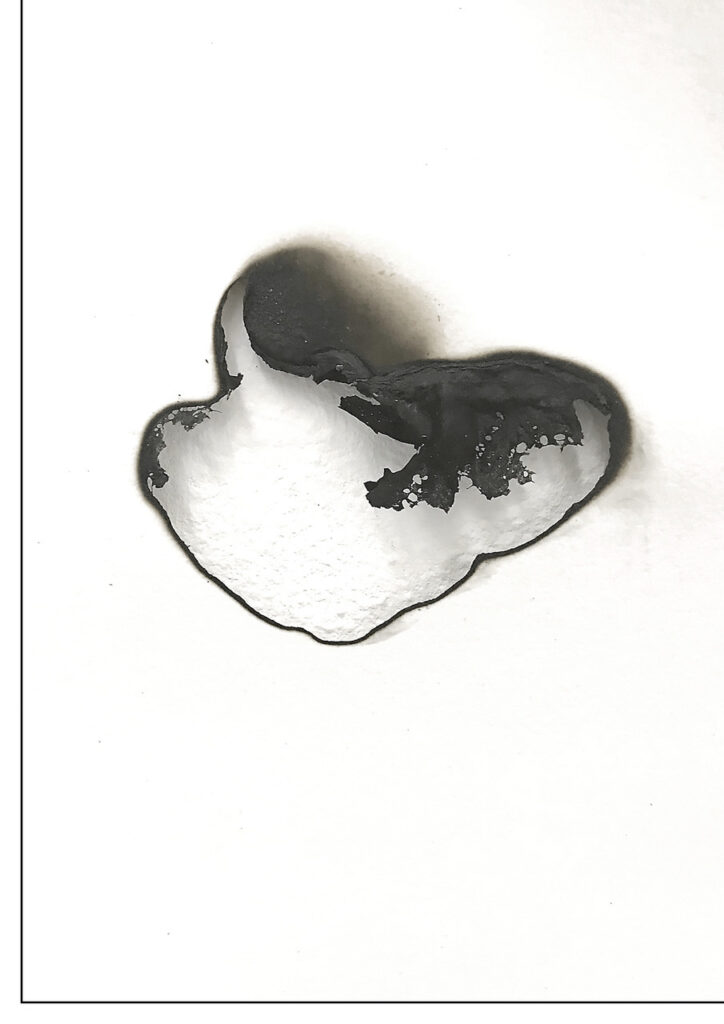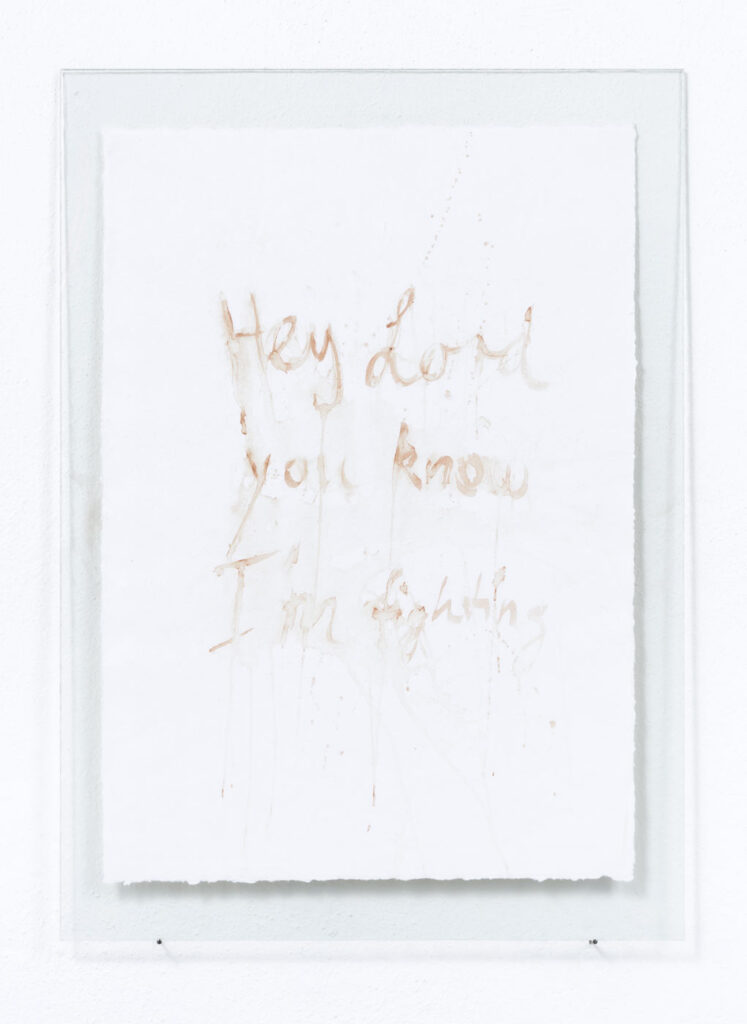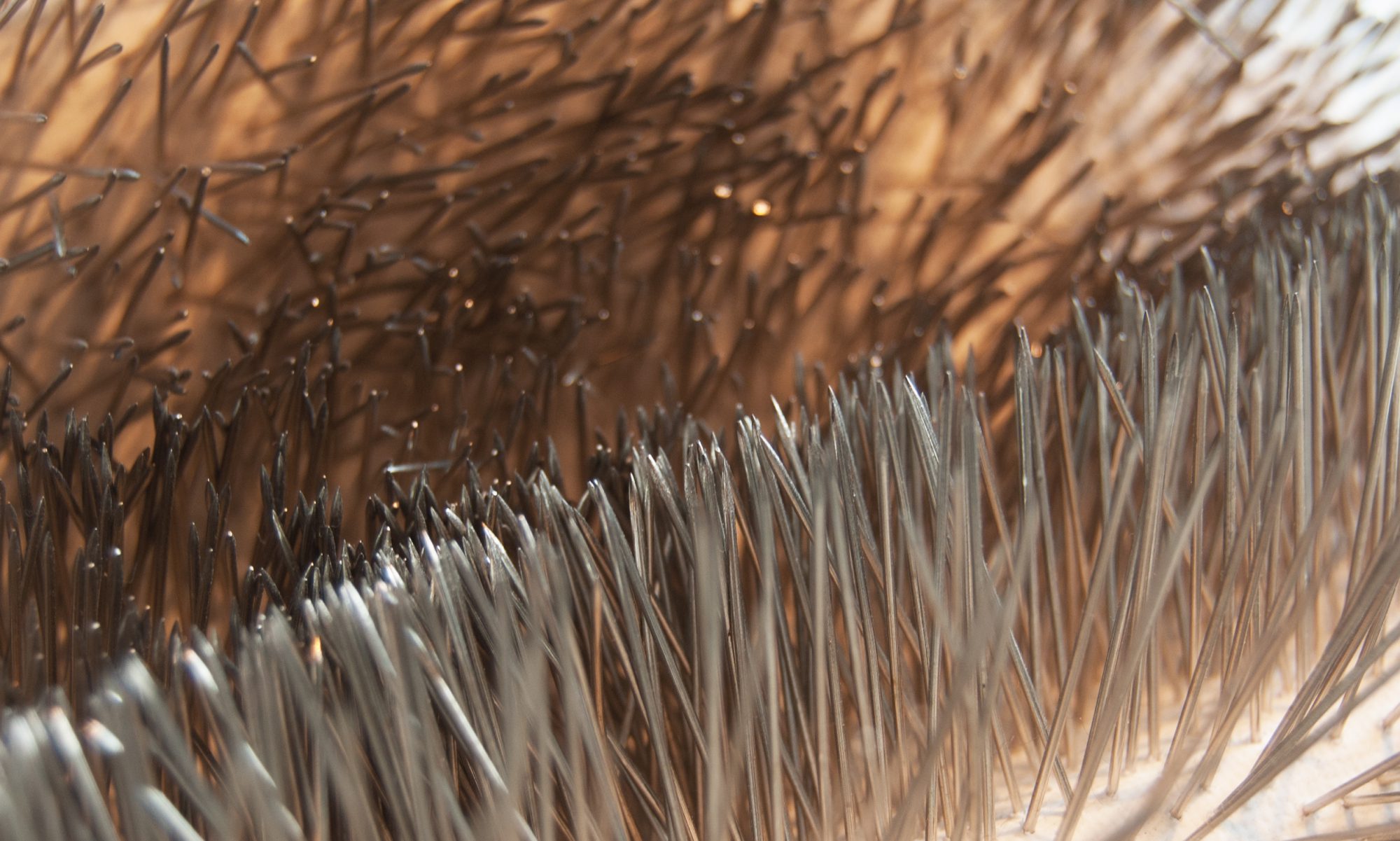Eröffnung: 21. April 2023, 19-21 h in der ODP GALERIE

ODP GALERIE
Rolf-Axen-Straße 35, 04229 Leipzig
21.04. opening 19 – 21h
22.04-extended 24.06.2023
Öffnungszeiten: Do-Sa 15-18h
Notizen zur Nähe
Zur Ausstellung von Anja Heymann
Text: Laura Bierau
Nichts prägt uns Menschen so sehr wie die früheste Erfahrung des Verbundenseins. Wir sind verbunden im Mutterleib und wenn wir geboren werden, brauchen wir Fürsorge und Schutz. Durch Berührung, Trost und Wärme lernen wir, zu vertrauen und was es heißt, sich geliebt zu fühlen. Ganz ohne Nähe zu anderen verkümmern wir. Als Äquivalent zur Nähe ist die Distanz ebenso essenziell für unser Sein: erst durch autonomes Handeln lernen wir, „Ich“ zu sein und für uns selbst Verantwortung zu tragen. Diese individuelle Erfahrung von Nähe und Distanz prägt unsere Identität und unsere späteren Beziehungen folglich tiefgreifend. Wir brauchen beides: Nähe und Abgrenzung, Fürsorge und Selbstständigkeit, Beschütztwerden und Selbstschutz. Doch oft bestehen hier Defizite oder Diskrepanzen, entsteht seelischer Schmerz. Aus unerfüllten Bedürfnissen können Sehnsucht, Unsicherheit, Ohnmacht, Wut oder Traurigkeit erwachsen – Ausgangspunkte menschlichen Leids. Die Suche nach Erlösung von Leid ist wiederum seit jeher Inhalt von Religion (und in heutiger Zeit auch der Psychotherapie).
Hey, Lord, you know I’m trying
Hey, Lord, you know I’m trying
It is all I got, is this enough?
Hey, Lord, I wanna stay
In ihrer Ausstellung „Notizen zur Nähe“ erforscht Anja Heymann auf poetische, sinnliche und mitunter provokative Weise die zutiefst menschlichen Bedürfnisse nach Nähe und Geborgenheit und die Gefühle, die durch deren Abwesenheit entstehen. Sie kreiert mit ihren multimedialen Arbeiten ein intimes Setting, um unterschiedlichen Nuancen dieser Emotionen, deren zyklischen Erscheinungen und den daraus resultierenden körperlichen Reaktionen einen Raum zu geben, sie wirken zu lassen. Die Betrachtenden sind in dieser intimen Sphäre eingeladen, im Dialog mit den Werken auch das eigene Empfinden zu erkunden: Was erkenne ich, was wird in mir ausgelöst? Ist da Neugier, Mitgefühl, Irritation oder gar Auflehnung? Führt diese intime Nähe zu einer anderen Person zu Unbehagen?
Hey, Lord, you know I’m fighting
Hey, Lord, you know I’ll find it
I don’t know when or how, today
Hey, Lord, I’m on my way
(Zitate aus dem Song „I’m Tired“ von Labyrinth und Zedaya, „Euphoria“ OST )
Die Beobachtung und Untersuchung eigener Gefühle, von Beziehungsgeflechten und verschiedenen Rollen, die in diesen eingenommen werden, bilden Anja Heymanns künstlerischen Ausgangspunkt. In ihren Arbeiten setzt sie sich dabei unter anderem mit den Gestaltgesetzen der Wahrnehmung auseinander und reflektiert die Ambivalenz von Anziehung und Abstoßung, Gemeinsamkeit und Selbstbehauptung, Verletzbarkeit und Hingabe. Diese Gegenpole werden spielerisch über die Materialität versinnbildlicht, indem traditionelle künstlerische Materialien wie Papier, Leinenstoff und Glas mit realen oder symbolischen Körperflüssigkeiten und Organen kombiniert werden. Sie spielt mit einer abstrakten Formensprache aus Kreisen, Linien, Tropfen und sich zufällig ergebenden Konturen sowie mit grafischen Elementen. Diese rekurrieren bewusst auf christliche Ikonographie und evozieren Assoziationen eines Heiligenscheins (Arbeit „Reliquie“), eines Maphorions (der Schleier der Madonna, Arbeit „Coat of infity“), eines brennenden Herzens (Das verbrannte Organ „Lass Licht rein“) oder der Tränen der Madonna (Arbeit „Visu“). Die Bezugnahme auf das Christentum entspringt dabei keiner religiösen Einstellung der Künstlerin, sondern der Hinterfragung der kulturhistorischen Prägung der „westlichen“ Gesellschaft, die sich in einem bestimmten Menschenbild und Rollenverständnis manifestierte. Die Erhöhung von Jesus Christus als einzigem Erlöser allen Leidens, das kirchliche Patriarchat mit seiner Entmachtung der Gläubigen zu Sündern, die ihr Seelenheil nur durch die Kirche und den Glauben erlangen können (Arbeit „Abwesenheitsnotiz“ und „Anwesenheitsnotiz“) sowie die Reduktion der Frau auf eine unbefleckte, unterwürfige und fürsorgliche Mutterrolle (Maria/ Visu) wirken bis heute nach (Arbeit „Ich versuch’s mal“). Gleichzeitig bilden christliche Werte wie Nächstenliebe noch immer die Basis unserer Zivilisation, sind christliche Feiertage Anlässe für Gemeinschaftlichkeit, ist das volksgläubige „Oh mein Gott!“ in unserem Sprachgebrauch fest verankert. Das Beten zu Gott in einer Notsituation oder der Glaube an eine höhere Macht kann in schwierigen Situationen Halt und Trost spenden und ist selbst in der heutigen Popkultur nach wie vor en vogue (Arbeit „Fighting“). Die unheiligen, gar ungeniert irdischen und trivialen Materialien, die in Anja Heymanns Arbeiten auf göttliche Symbole für Schutz, Trost und Erlösung treffen, erzeugen eine ambigue Ästhetik und transferieren die sakralen Themen in einen zeitgenössischen Kontext, nicht ohne subtile Ironie, jedoch ohne eindeutig Stellung zu beziehen. Welche Darstellungen und Formen verbleiben im kollektiven Gedächtnis? Die Betrachtenden sollen eine eigene Antwort, einen eigenen Erlösungsweg finden.
Im Epizentrum der Ausstellung „Notizen zur Nähe“ ragt die großformatige Arbeit „Schutzmantel der Unendlichkeit“ empor. Über ein hohes, rundes Stahlgestell drappiert fallen einfache Leinenbahnen auf den Boden und schaffen einen zeltartigen Raum im Raum. Das Leinen ist über und über mit Nadeln besteckt, deren scharfe Spitzen von innen nach außen ragen und auf der Außenfläche eine Struktur ergeben, die einem silbrigen Fell ähnelt. Im Inneren des Schutzmantels blinken die Nadelköpfe wie Sterne im Firmament, wodurch das Innere auch als Öffnung „nach oben“ wirkt. Der Schutzmantel ist ein Rückzugsort, ein „Safe Space“, der nicht nur von Einsamen, sondern auch in Zweisamkeit aufgesucht werden kann, um Geborgenheit und Zuflucht zu erfahren, um zu ertragen, was eigentlich untragbar ist – so wie der Mantel selbst. Denn jede zwischenmenschliche Beziehung ist fragil, kann von inneren und äußeren Einflüssen bedroht werden oder ist gerade, mit Blick auf die jüngste Epidemie, auch ein Sinnbild für das Bedürfnis nach Sicherheit, das man durch Verbundenheit stillen kann. Der Schutzmantel symbolisiert durch seine Oberflächenbearbeitung die durchlässige, poröse Grenze zwischen Innen und Außen, zwischen Nähe und Distanz, zwischen menschlich und göttlich: Verstecken und Offenbaren, Berühren und Zurückweisen, Animalität und Anima.
Darüber hinaus reflektiert Anja Heymann die Idee des Schutzraumes im Kontext ihrer eigenen Biografie als Mutter und Ehefrau durch die Frage, wie sich Künstlerinnen in der Kunstwelt selbst behaupten können. Das Stecken der rund drei Millionen Nadeln in die Leinwand ist zum einen der Versuch, sich buchstäblich ein dickes Fell gegenüber Erwartungen von außen zuzulegen. Zum anderen will sie die Anstrengungen weiblicher Arbeit sichtbar machen, als ein „leiser feministischer Akt“. Diese Arbeit müsse oft mit Selbstaufopferung einher gehen, um überhaupt anerkannt zu werden. Für Heymann entwickelte sich der Prozess des Nadelsteckens nicht nur zur schmerzhaften, obsessiven Filigranarbeit, sondern auch zum Erkenntnisprozess über das eigene künstlerische Schaffen, das manchmal einem Martyrium gleicht. Ohne kollektive und institutionelle Hilfe wäre die Arbeit womöglich nicht entstanden, was zeigt, wie wichtig der Schutz und die Unterstützung künstlerischer Freiräume ist, privat wie gesellschaftlich. Mit Blick auf die Vereinbarkeit von Familie, Karriere und Selbstbestimmung sieht Anja Heymann es als eine höhere, in gewisser Weise heilige Aufgabe der heutigen Gesellschaft an, für Geschlechtergerechtigkeit in der Kunst zu sorgen und dabei immer neu auszuhandeln: Wer braucht Schutz, wer kann ihn geben? Wie nah sollten wir zueinander stehen?

fighting, Büttenpapier,Körperflüssigkeit, 50x70cm Glasrahmung, 2023
